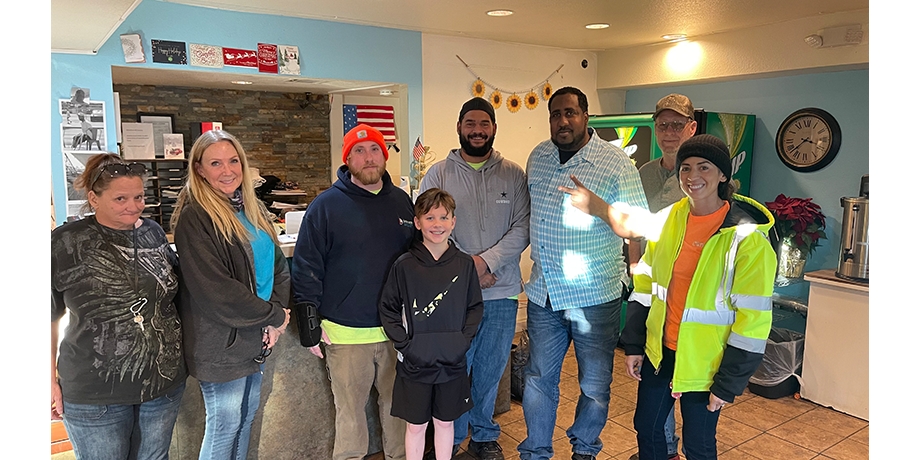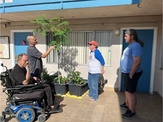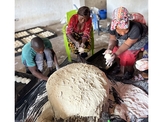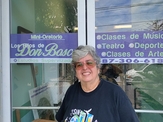One Great Hour of Sharing
Embodying kindness on the streets of Las Vegas
One Great Hour of Sharing gifts helps Caridad Gardens restore houseless veterans and neighbors back into community
For Shawn Duncan, it’s the little things — like getting a birthday card — that mean a lot.
Perhaps it’s because Duncan, a military veteran living in Las Vegas, hadn’t had a mailbox in years.
Or a home.
A native of Michigan with no strong family ties, Duncan had been struggling for years with homelessness and mental health issues — including PTSD — when a chance encounter on Facebook with his former youth pastor changed the direction of his life.
“I hadn’t talked to him in years, but after my old pastor and I got up on Facebook, he called me later that night and said, ‘Hey, let’s talk,’” Duncan recalled. “And we prayed. That’s when he introduced me to Caridad and Merideth.”
Duncan’s life-changing introduction was to Caridad Gardens, a Las Vegas-based nonprofit dedicated to helping and “humanizing the homeless” — through job skills training and mental, emotional and physical wellness programs — and its founder, Merideth Spriggs, a former youth pastor who was once homeless herself.
Spriggs started the organization in San Diego, where she was living at the time, not long after the university where she had been employed laid her off. As a result, she ultimately lost everything, including her unemployment benefits and her home.
“I realized if homelessness could happen to me, it could happen to anybody; and that I could be a unique voice,” said Spriggs, whose own work as a volunteer with the San Diego Rescue Mission proved transformational. “Even though I really felt God’s calling on my life to do this, most days I would not have picked this — and still don’t pick this — but I do not feel released from my calling.”
What began in San Diego in 2009 as an all-volunteer organization — which Spriggs said was “a mess to operate” — moved to Las Vegas in its “3.0 version” in 2013.
Spriggs, who has always been Caridad’s director, bears the unique title of its chief kindness officer.
“When I was doing street outreach in 2014, it was a police officer I was working with who inspired it,” she recalled. “When I gave him my card, he said, ‘That title, director, doesn’t fit you at all. You need to be the kindness officer or something.’ So, I Googled it and since there was no such title, I made it up.”
The unique, street-centered, V.I.P. “concierge approach” of Caridad Gardens is made possible, in part, through a grant from the Presbyterian Committee on the Self-Development of People (SDOP), which is in turn supported by Presbyterians’ generous gifts to One Great Hour of Sharing.
For 75 years, its purpose of helping neighbors in need around the world remains constant, giving the PC(USA) and other Christian denominations a tangible way to share God’s love. In addition to SDOP, One Great Hour of Sharing also benefits the ministries of the Presbyterian Hunger Program and Presbyterian Disaster Assistance.
Although the Offering may be taken anytime, most congregations receive it on Palm Sunday or Easter Sunday, which this year fall on March 24 and March 31 respectively.
Duncan agrees that the title suits Spriggs, not only because she dispenses kindness, but because she also embodies it.
“Merideth has been a big inspiration to me,” said Duncan. “She is not someone who is just talking about something, but she’s actually doing something. She’s not necessarily beating people over the head with the Bible, she’s actually living it — walking the walk and treating people with kindness and respect. It gives me something to be a part of. It tells me something that I want to be.”
Christopher Litwin — another Caridad client, who was recently released from prison after serving a 10-year sentence — has his own nickname for Spriggs.
“She’s the hybrid between Princess Diana and Mother Teresa,” he said with a smile.
Not unlike her spiritual predecessors, Spriggs, too, saw the need to serve the most vulnerable of God’s children by providing education, access to care, meaningful employment, and by meeting the most basic human needs.
Caridad’s “Undies Sunday” — complete with its own superhero, Mighty Tighty — ensures that its clients have socks and underwear, with Hanes having recently joined with the nonprofit as a corporate sponsor. One of Spriggs’s close friends also gave Caridad the use of his farm, where the organization has grown and distributed fresh produce both to supply area restaurants and to feed the hungry.
“The work of Caridad Gardens, in many ways like Matthew 25, acknowledges that we find the plight of Jesus as well as hope in those who are directly impacted by poverty,” said the Rev. Dr. Alonzo Johnson, coordinator of the Presbyterian Committee on the Self-Development of People. “Caridad Gardens engages in the intersectional work of recognizing that poverty, race and class are intimately linked. As the Matthew 25 initiative in the PC(USA) focuses on God’s reconciling and transforming work, we see strong traces of this in Caridad Gardens and their ability to walk alongside, gently and lovingly, those who know well the power of trauma and destitution.”
As Caridad’s mission continues to expand, the organization has recently added two new partners. In 2021, Caridad assumed oversight of Hebron, a low-income housing complex for veterans, people experiencing homelessness and seniors. They also gained use of another farm through the Las Vegas Rescue Mission, where they also started a new program in the fall of 2023.
Duncan, who previously ran Caridad’s earlier farm operation, is grateful to the organization for providing him with stable housing and employment as well as for helping him to get the counseling and medications he needs.
But for Duncan, it’s the relationships that are paramount.
“I have a strong memory of an event where I ran into another veteran who I hadn’t seen in a while,” he recalled. “Seeing him and saying, ‘Hey, what’s going on,’ and being able to bond with him and different people, gave me a sense of community that I didn’t have. Meeting people and forming relationships, where we share common things — our struggle with mental health, our struggle with homelessness — we’re able to have that support and support each other.”
Restoring people back into community is also a guiding principle for Spriggs.
“I always tell the neighbors that this isn’t a leper colony; these are your neighbors and so it’s our job to surround them and support them,” she said. “They’re no different than my other neighbors.”
And, coming from the “church world,” it’s natural for Spriggs to ask what Jesus would do.
“I tell people Jesus says you should feed the homeless, but he doesn’t stop there,” she continued. “Jesus didn’t call us to give people a stale peanut butter and jelly sandwich — he called us to be in community, and that’s where we miss the mark. A drive-by feeding at a rescue mission or a shelter where you keep moving on and feel good about yourself, saying, ‘Oh, look at those poor people, we don’t have it like them,” is not what we’re called to do. We’re called to be with our neighbors.”
Which is exactly what One Great of Hour Sharing is designed to do.
“Presbyterians should give to One Great Hour of Sharing because it is a way that Presbyterians can be connected to the ministries and communities that engage in the work of healing and wholeness through disaster, hunger and development,” Johnson said. “Giving to the Offering creates an opportunity for Presbyterians to be intentional about embodying justice and hope by involving them in the changing of lives and communities in deeply profound and healing ways.”
read more stories:
participate with us
When we all do a little,
it adds up to a lot.
Each gift to One Great Hour of Sharing helps to improve the lives of people in challenging situations. The Offering provides us a way to share God’s love with our neighbors in need. In fact, OGHS is the single, largest way that Presbyterians come together every year to work for a better world. Join us!







